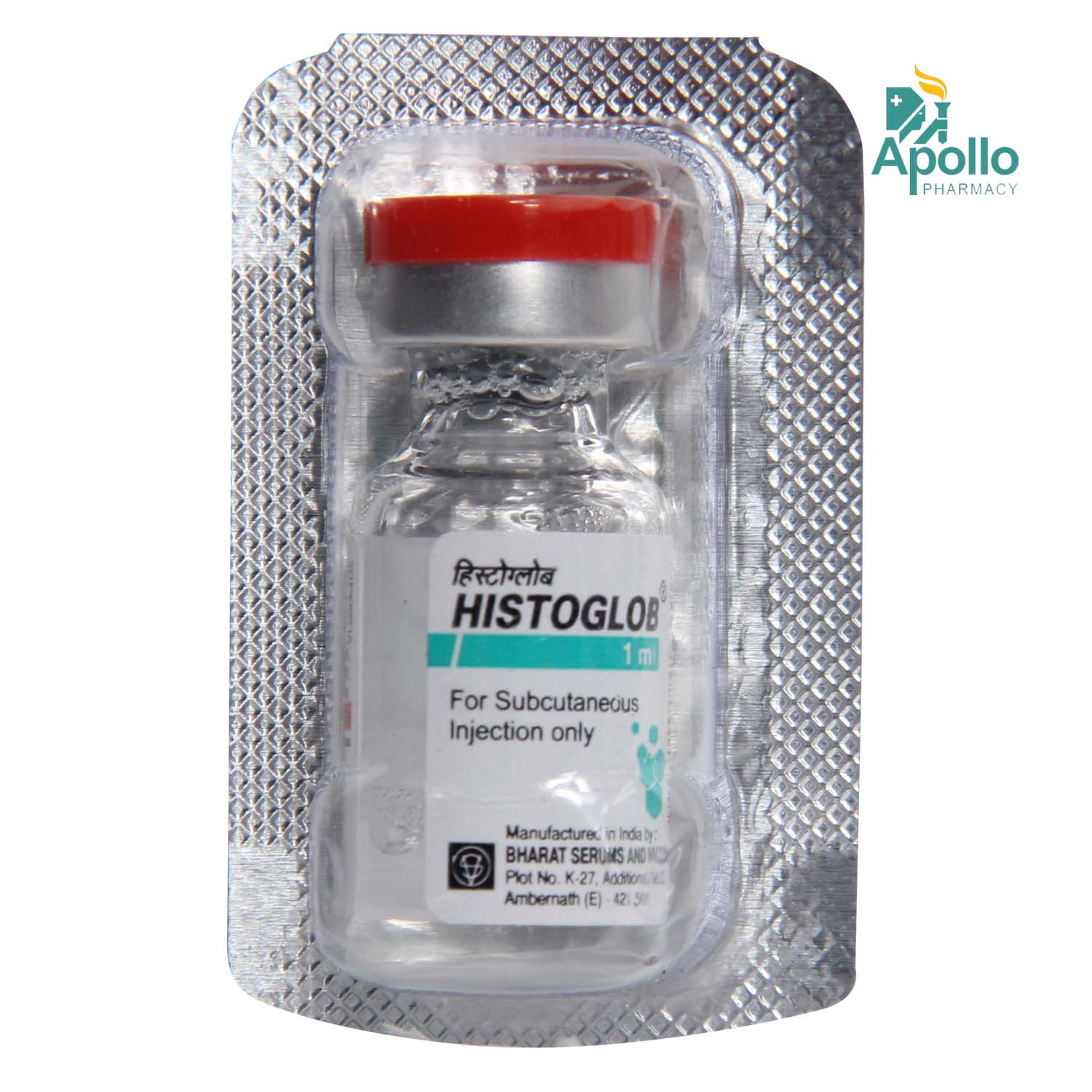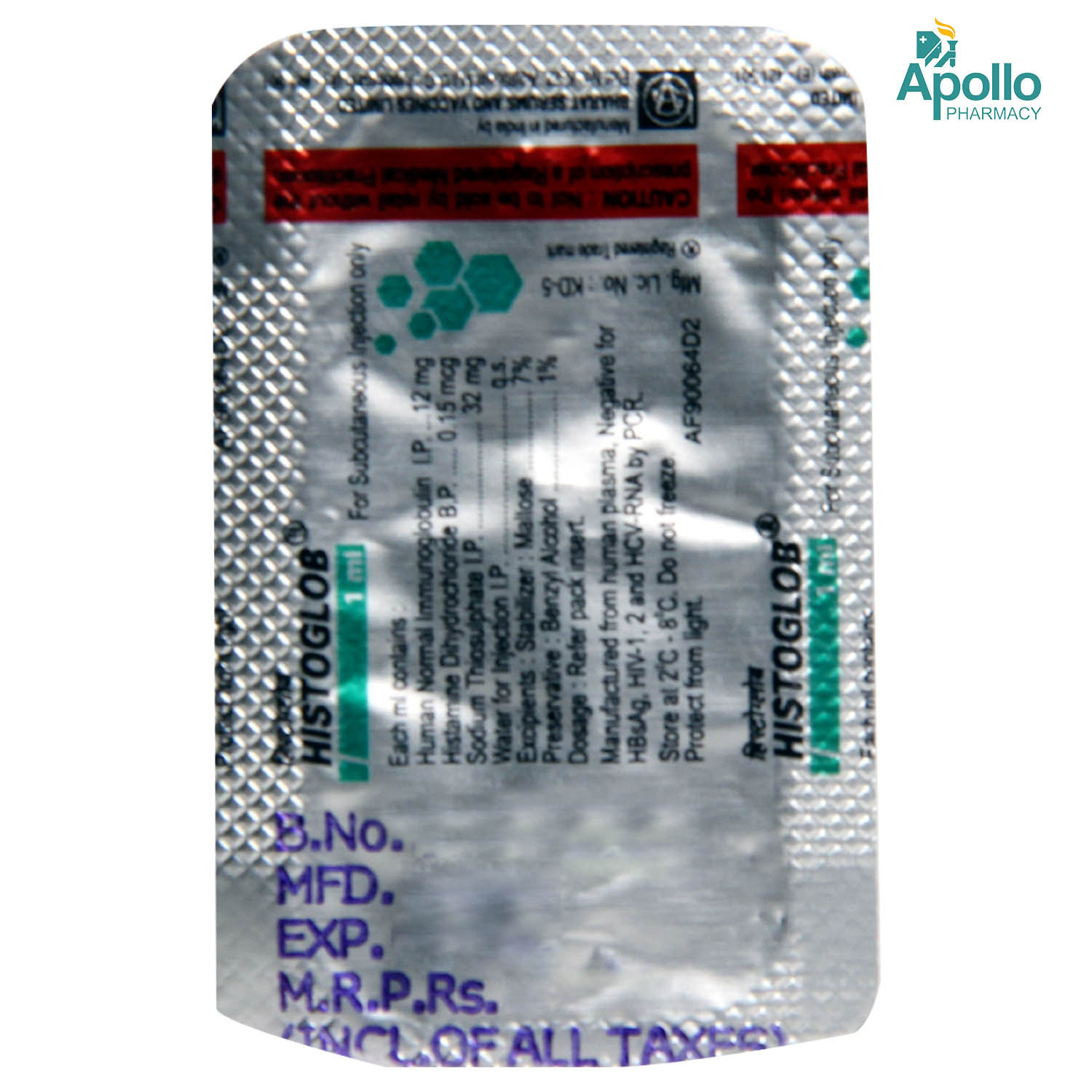Histoglob Injection 1 ml
MRP ₹190.5
(Inclusive of all Taxes)
₹22.9 Cashback (12%)
Provide Delivery Location
Online payment accepted
 Prescription drug
Prescription drugWhats That
Manufacturer/Marketer :
Consume Type :
Expires on or after :
Return Policy :
About Histoglob Injection 1 ml
Histoglob Injection 1 ml belongs to a class of medicines called immunizing agent. It is primarily used in the treatment of allergic reactions like allergic rhinitis (inflammation in the nose) and urticaria (the occurrence of swollen, pale red bumps or plaques on the skin). It is also used in treating eczema (a skin condition that causes patches of itchiness, inflammation, swelling, and cracked skin) and premenstrual syndrome (PMS).
Histoglob Injection 1 ml is a combination of three medicines, Human Normal Immunoglobulin, Histamine and Sodium Thiosulphate, which are used in the treatment of allergic reactions like allergic rhinitis and urticaria. This medicine works by blocking the action of certain chemical messengers that are responsible for inflammation, congestion, itching and other allergic reactions.
Histoglob Injection 1 ml will be administered by a trained healthcare professional. Hence do not self-administer. This medicine may cause certain side effects such as swelling or hardening at the injection site, headache, and flu-like illness (runny nose and sore throat). These side effects are usually mild and temporary. However, if any of the side effects persist or get worse, inform your doctor immediately.
Histoglob Injection 1 ml should be avoided if you are allergic to any of its components. Before receiving Histoglob Injection 1 ml, inform your doctor if you have had any vaccinations recently or have already had this product recently. Histoglob Injection 1 ml should be used with caution in people with immunoglobulin A (IgA) deficiency (IgA is a type of antibody that protects against infections). Histoglob Injection 1 ml is not recommended for use in pregnant women, during menstruation and during an acute allergic attack. Inform your doctor about all your medical conditions along with your medication history, including herbal and vitamin supplements.
Uses of Histoglob Injection 1 ml
Directions for Use
Key Benefits
Histoglob Injection 1 ml contains a combination of three medicines, Human Normal Immunoglobulin, Histamine and Sodium Thiosulphate, which are used in the treatment of allergic reactions like allergic rhinitis and urticaria. This medicine works by blocking the action of certain chemical messengers that are responsible for inflammation, congestion, itching and other allergic reactions. It is also used in the treatment of eczema, premenstrual syndrome, bronchitis, and migraine. Histoglob Injection 1 ml is also used as prophylaxis treatment in children (where there is a family history of allergy) who are about to undergo an adenoidectomy or tonsillectomy.
Storage
Drug Warnings
Histoglob Injection 1 ml should be avoided if you are allergic to any of its components. Before receiving Histoglob Injection 1 ml, inform your doctor if you have had any vaccinations recently or have already had this product recently. Histoglob Injection 1 ml should be used with caution in people with immunoglobulin A (IgA) deficiency (IgA is a type of antibody that protects against infections). This medicine is intended for subcutaneous administration (injection given in the fatty tissue, just under the skin) only. Histoglob Injection 1 ml is not recommended for use in pregnant women, during menstruation and during an acute allergic attack. Inform your doctor about all your medical conditions along with your medication history, including herbal and vitamin supplements. Histoglob Injection 1 ml should be used with caution in people with obesity or overweight, diabetes, high blood pressure (hypertension), hypovolemia (low blood volume), and blood clotting disorders, as there is a risk of developing a blood clot (very rare effect of Histoglob Injection 1 ml). Also, let your doctor know if you have any kidney problems.
Diet & Lifestyle Advise
- Eat a healthy diet that includes grains, fresh fruits, vegetables, lean meats, and dairy products.
- Stay active and do moderate exercises every day. Maintain a normal weight.
- Get enough sleep, as sleep and immunity are closely related.
- Limit intake of sugar-rich foods or drinks.
- Staying hydrated is vital for those with a cough or cold. Drinking liquids at room temperature can alleviate cough, runny nose and sneezing.
- Manage stress levels.
- It is advised to avoid contact with known allergens (allergy-causing agents) such as pollen, dust, etc. Certain food items are known to cause allergies to you.
- Maintain personal hygiene and keep your surroundings clean.
Side Effects of Histoglob Injection 1 ml
- Injection site reactions
- Headache
- Swelling or hardening at the injection site
- Fever
Habit Forming
Therapeutic Class
All Substitutes & Brand Comparisons
Author Details
We provide you with authentic, trustworthy and relevant information
FAQs
Drug-Drug Interactions Checker List
- FUROSEMIDE
- MMR VACCINE
- VARICELLA (LIVE ATTENUATED)
Special Advise
- It is advised to avoid contact with known allergens (allergy-causing agents) such as pollen, dust, etc. Certain food items are known to cause allergies to you.
- Histoglob Injection 1 ml should not be given intravenously.
- Do not take any vaccines (especially live vaccines) at least three months after taking Histoglob Injection 1 ml as this medicine may make the vaccine less effective.
Disease/Condition Glossary
Allergic rhinitis: When the immune system overreacts to allergens in the air, allergic rhinitis, a type of nasal inflammation, results. Runny or stuffy nose, sneezing, red, itchy, and watery eyes, as well as swelling around the eyes, are signs and symptoms of this condition. Dust mites, pollen, spores, animal skin, urine, and saliva are among the most common airborne allergens that cause rhinitis.
Urticaria: Hives, or urticaria, are sudden outbreaks of swollen, pale red bumps or plaques (wheals) on the skin that can occur as a result of an immune system reaction to certain allergens or for unknown causes. The skin's surface may develop welts that are itchy, raised, red, or skin-coloured.
Premenstrual syndrome (PMS): It is a condition in which a group of symptoms occurs between ovulation and menstruation. Symptoms of PMS include mood swings, fatigue, food cravings, breast tenderness, and irritability.
Eczema: It is a condition in which skin patches become inflamed, itchy, cracked and rough. Symptoms include a rash on the arms and behind the knees. Eczema can be triggered by various factors like foods, drinks, skin products, soaps, chemicals, detergents, make-up products, chlorinated pools, and stress.

Have a query?
Alcohol
Safe if prescribed
Histoglob Injection 1 ml may not interact with alcohol. However, limit or avoid the consumption of alcohol to avoid possible side effects.
Pregnancy
Consult your doctor
Histoglob Injection 1 ml is not recommended for use in pregnant women. Hence, inform your doctor if you are pregnant or planning to become pregnant before receiving Histoglob Injection 1 ml. Your doctor may suggest an alternative medicine based on your health condition.
Breast Feeding
Consult your doctor
Inform your doctor if you are breastfeeding before receiving Histoglob Injection 1 ml. Your doctor will assess the benefits and the risks before prescribing.
Driving
Safe if prescribed
Histoglob Injection 1 ml usually does not affect your ability to drive or operate machinery.
Liver
Consult your doctor
Let your doctor know if you have any history of liver diseases. Your doctor will weigh the benefits and potential risks before prescribing Histoglob Injection 1 ml.
Kidney
Consult your doctor
Let your doctor know if you have any history of kidney diseases. Your doctor will weigh the benefits and potential risks before prescribing Histoglob Injection 1 ml.
Children
Safe if prescribed
Histoglob Injection 1 ml can be safely used in children when prescribed by a paediatrician.







.jpg?tr=q-85)

